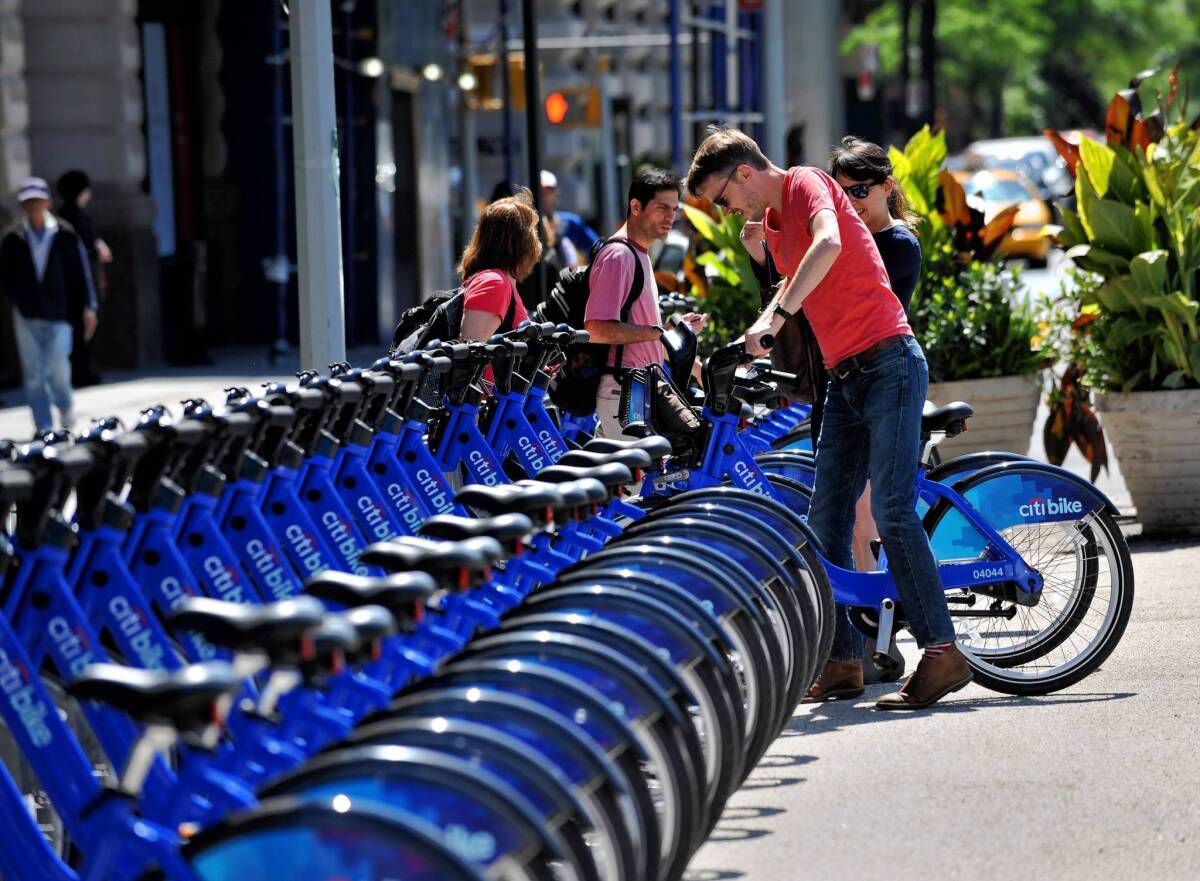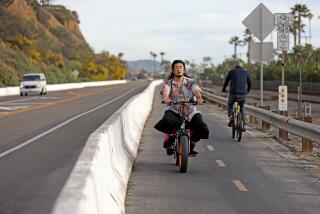L.A. bike-sharing program hits a snag

- Share via
Bike-sharing in Los Angeles has hit a roadblock.
In spring 2012, Tustin company Bike Nation predicted the first phase of its L.A. bike-share program would be up and running by summer 2013. Soon after, officials said, as many as 4,000 bikes would be available to rent by the hour, the day or the week — similar to CitiBike, the program that launched in New York City last month to much fanfare.
To make money, the company planned to sell advertising on the 400 sleek, silver rental kiosks that it would place around Los Angeles. But a contract between the city and two media firms will almost certainly prevent that from happening, the company recently learned.
Bike Nation has delayed the bike-share launch while it reconfigures its business model and searches for corporate sponsors. Bike Nation’s executives say the earliest the program will roll out is sometime next year.
“Our business has to make financial sense,” said Bike Nation Chief Operating Officer Derek Fretheim.
The company expects to launch initially without ads but possibly add them later. Executives wouldn’t say how much ad revenue they had expected.
Bike Nation pitched the bike-sharing program to the mayor’s office in March 2012 and said it would cost the city nothing. It planned to put kiosks downtown and in Hollywood, Venice and Westwood. Cyclists would be able to rent bikes for $6 a day or $75 a year.
The city has since developed a permitting process for bike-sharing, which is available to any company. Each kiosk would be reviewed separately. So far, Bike Nation is proposing kiosks at Union Station, City Hall, the county Hall of Administration and Los Angeles Police Department headquarters.
In the U.S., where bike-sharing has proliferated in the last five years, cities use grants and corporate sponsors (CitiBank is helping fund New York’s CitiBike) to shore up systems that can’t be sustained on membership and usage fees alone.
Some European bike-shares are run by companies that hold exclusive rights to the advertising space on the rental kiosks. But in the U.S., Bike Nation reasoned, advertising would be a new twist.
But advertising on a bicycle kiosk in Los Angeles falls under a city contract with CBS Outdoor and JCDecaux, which jointly hold the rights through 2021 to sell advertising on “street furniture,” which includes bus stops, public toilets and newsstands.
Bike Nation executives knew about the contract and had hoped to find wiggle room because it does not specifically mention bicycle kiosks. But any item placed in the public right of way, even if it isn’t listed in the contract, is in CBS’ and JCDecaux’s purview, according to a spokeswoman for the city’s Bureau of Street Services. That includes sponsorship messages.
The company has “extended the olive branch” to CBS/JCDecaux, Fretheim said, hopeful that JCDecaux would be amenable because the French company runs a bike-share program in Paris that depends on advertising revenue. But “nothing has been defined on their side,” he said.
CBS declined to comment publicly, but an official speaking on background said the company supported bicycle sharing in Los Angeles. JCDecaux did not respond to emails seeking comment.
After Eric Garcetti replaces Antonio Villaraigosa as mayor July 1, Los Angeles may be more flexible on the terms of the contract, said Navin Narang, a managing partner of First Pacific Holdings, the private equity group that owns Bike Nation.
The most viable immediate approach to bike-sharing, Fretheim said, would be to woo a corporate sponsor, similar to New York City’s agreement with Citibank and London’s with Barclay’s. Already, he said, Fortune 500 financial companies have expressed interest.
More to Read
Sign up for Essential California
The most important California stories and recommendations in your inbox every morning.
You may occasionally receive promotional content from the Los Angeles Times.











